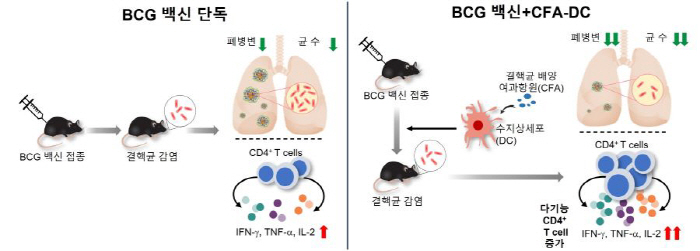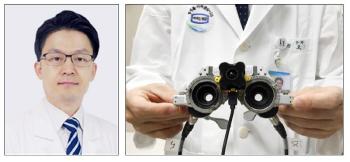Development of a new tuberculosis vaccine and treatment platform...More than 90% inhibition of tubercle bacillus growth
Aug 21, 2025
|
Professor Shin Sung-jae and Dr. Kim Hong-min's research team at Yonsei University Medical School announced on the 21st that they can use dendritic cells, which are antigen-presenting cells, to enhance the effectiveness of tuberculosis prevention and treatment with Professor Kim Jong-seok of Konyang University Medical School.
The findings were published in the international journal Journal of Advanced Research (IF 13.0).
Tuberculosis is a deadly infectious disease that has killed the most people in human history among the three major infectious diseases designated by the World Health Organization (WHO). It is estimated that about 25% of the world's population, more than 2 billion people, have been infected with Mycobacterium tuberculosis.
Currently, the only vaccine for tuberculosis is the BCG vaccine. The BCG vaccine is effective in preventing severe extrapulmonary tuberculosis, such as disseminated tuberculosis in childhood and meningitis in tuberculosis, but its effect on the most common form, post-adolescent pulmonary tuberculosis, is very limited. Recently, treatment has also become difficult due to the increase in antibiotic-resistant tuberculosis bacteria. This is the background in which the development of new vaccines and treatments to combat tuberculosis is necessary.
The research team found a strategy to increase the effectiveness of tuberculosis vaccines and treatments by utilizing dendritic cells, which are antigen-presenting cells that induce immune responses. Dendritic cells first detect and process antigens such as bacteria or viruses that have invaded the body, then transmit antigen information to T cells to initiate an immune response.
First, the BCG-vaccinated mice were injected with dendritic cells activated with antigenic components extracted from Mycobacterium tuberculosis. Within a week of Mycobacterium tuberculosis infection, T cells recognizing Mycobacterium tuberculosis infection rapidly increased in mouse lung tissues. Ten weeks after infection, Mycobacterium tuberculosis growth was inhibited by more than 90% compared to the BCG alone-administered group. In particular, not only increased T cells capable of simultaneously releasing IFN-γ, IL-2, and TNF-α, which are important cytokines for controlling Mycobacterium tuberculosis, but also many tissue memory T cells remained in the body for a long time were made. While BCG-vaccinated mice alone lost vaccine efficacy over time, mice given both the vaccine and dendritic cells maintained vaccine efficacy for a long period of more than 30 weeks.
Antibiotic treatment effects were also superior in the dendritic cell-administered mouse group to the antibiotic-only mouse group. The dendritic cell-administered mouse group showed a more than 90% reduction in Mycobacterium tuberculosis than the antibiotic-administered group and excellent efficacy in inhibiting the activation of latent tuberculosis and controlling multidrug-resistant Mycobacterium tuberculosis.
Professor Shin Seong-jae said, "This study is not just about enhancing the effectiveness of the vaccine, but it is also meaningful to present the principles of next-generation tuberculosis control strategies that can be applied to the entire pathogenesis of tuberculosis." "In order to control long-term and complex infectious diseases such as tuberculosis, an integrated vaccine and immunotherapy strategy linking prevention and treatment is needed, and dendritic cell-based technology is a very promising platform to realize this."
Meanwhile, this study was conducted with the support of the Korea Research Foundation's mid-sized researcher support project and the Korea Health Industry Promotion Agency's vaccine commercialization technology development project.
|
This article was translated by Naver AI translator.















